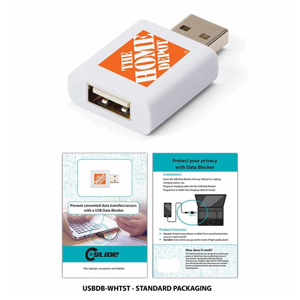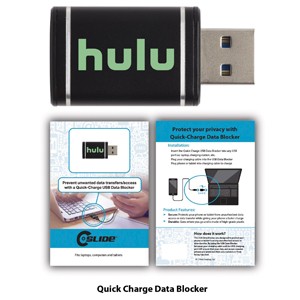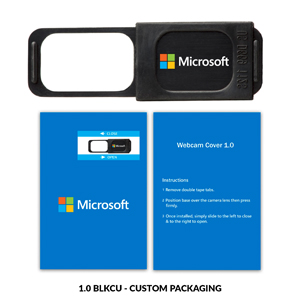Security Alert:
Prevent Data Breaches
With Privacy Promos
Damage related to cybercrime is projected to hit $6 trillion annually by 2021, per research by Cybersecurity Ventures. As more businesses switch to remote workforces, cybersecurity can no longer be an afterthought. Help clients and consumers stay safe with privacy-related promos that solve the most common security threats.
Threat:
Juice Jacking
Promo:
USB Data Blockers
Have you or your clients heard of "juice jacking" before? If not, you're risking a serious cybersecurity breach every time you plug in to a public charging station. While a convenient way to power up tech on the go, these communal stations could actually drain your bank account. Hackers use that shared connection to access personal information on plugged-in devices, such as addresses, phone numbers, locations and credit card numbers – all while the device's owner is completely unaware. Not good.
Watch this short video to learn more about how juice jacking works.
To prevent this, educate your clients on the power of USB data blockers. These tiny-yet-mighty tech devices plug into devices to stop all data transfer between the device and the USB port. Not only are they compatible with any charging cable that plugs into a USB port, they're also an extremely cost-effective way to increase security no matter where end-users are.
Increase Security With C-Slide

This powerful, affordable promo is just the thing to protect phones or tablets from any unauthorized access or data transfer.

With faster charging speeds than most data blockers on the market, this is the promo you'll want to present.
Threat:
Webcam Hackers
Promo:
Webcam Covers
Being spied on doesn't only happen in the movies – it can happen to anyone with a webcam. "By leaving your webcam uncovered, you are essentially placing a surveillance camera in your home," says Jake Moore, a cybersecurity specialist at ESET. Victims can then be extorted for money in exchange for captured video of them in vulnerable moments, such as while changing or showering. Remember, with more people working from home and young children learning virtually, this is even more of a concern as webcams give hackers access to these users 24/7.
Your clients can stop them in their tracks by investing in webcam covers. For a low cost, companies and schools can equip all of their staff and students with webcam covers that will block a hacker's view of them. But don't worry: Webcam covers can be easily flipped to show the camera when needed, such as for a video conference. Then, when end-users are done, they can just flip the cover shut again.
Increase Security With C-Slide

Great for desktops
As the original branded webcam cover to hit the promo market, this item proves you simply can't beat the classics.
Threat:
Eavesdroppers
Promo:
Microphone Blockers
43% of Americans believe their smartphones are recording them without permission, per a recent Consumer Reports survey. Regardless of if that's true or not, it's clear unwanted audio listening is a fear for almost half of the U.S. Even if phone manufacturers aren't to blame, there is a very real threat of hackers taking control of a device's microphone and audio features to listen in on unknowing victims.
Fortunately, there's a simple promo to prevent this. Microphone blockers are essentially a dummy plug-in that goes in audio jacks to trick devices into thinking a microphone is plugged in, so it switches from its built-in microphone to the microphone blocker instead. Of course, the microphone blocker isn't doing anything other than filling the slot, so hackers trying to tune in won't hear anything.
Increase Security With C-Slide
Threat:
Data Scanners
Promo:
RFID Blockers
Have you ever had your credit card information stolen before? If so, you may have fallen victim to an RFID (Radio Frequency Identification) scammer attack. While RFID technology is convenient, it's also susceptible to being attacked via RFID card readers and data scanners. Criminals use these tools to steal data via the RFID information on credit and debit cards – all without you having any idea an attack has taken place until you notice unfamiliar charges on your billing statement.
RFID-blocking cards prevent criminals from being able to access data via data scanners, keeping credit card details safe. While good to have at all times, RFID blockers are especially useful in public locations where data skimming attacks usually happen, such as at ATMs, gas pumps, parking garages or other communal areas with shared credit card scanners.






